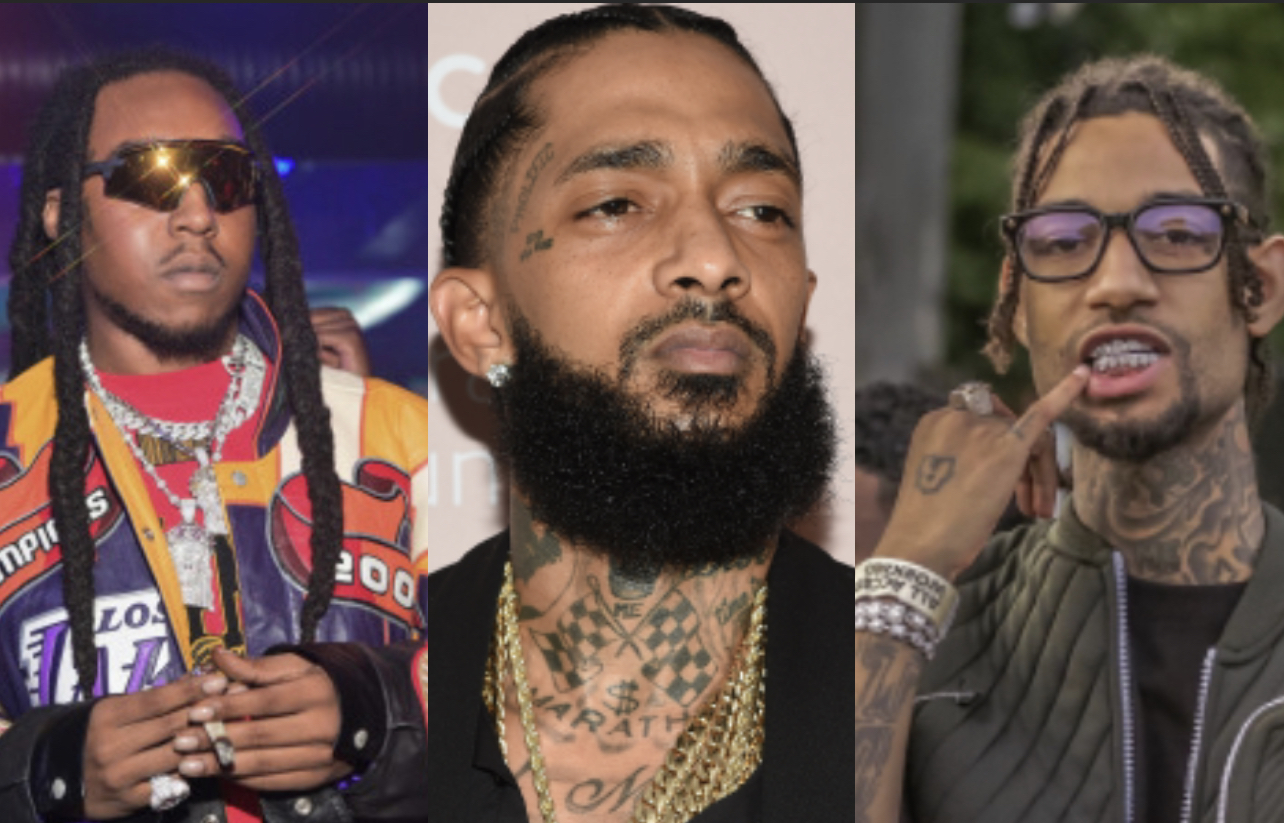
Source: Getty/Radio One/Justin Thomas / Getty/Radio One/Justin Thomas
Snoop Dogg once said it makes the world go around. Kanye West said it’s been around so long that textbooks can be written about it. Pete Rock said it runs through his veins at all times. Chuck D says it all comes from the humble beginnings of rebelling against the status quo.
Talib Kweli said it was a vehicle, but Lauryn Hill called it a movement. Ludacris said it was about emotion. Method Man said it was a gimmick and a great lie. Pac said it will fuck you up. Nas said it was dead. KRS-One declared that it was something you do, not something you live.
And maybe therein lies the problem.
Because while there is so much that can be said about hip-hop, no one knew it enough to imagine it would one day become one of the most dangerous professions in America.
On Nov. 1, rapper Takeoff (born Kirshnik Khari Ball) was murdered in Houston, Texas. Takeoff was widely known as one-third member of the hip-hop group Migos alongside his Uncle, Quavo, and Quavo’s cousin, Offset.
The untimely death of Takeoff shook our culture by storm— raising outrage against senseless violence and ways to possibly eradicate the dark cloud of tragic death many rappers fail to escape. More urgently, Takeoff’s death reignited difficult conversations about the normalcy we relive whenever hip-hop is marked by tragedy.
In the past 35 years, over 60 hip-hop musicians have been murdered. A study in The Conversation found that over 50 percent of hip-hop musician deaths are caused by murder, and hip-hop has the highest rate of homicides than any other genre of music.
And perhaps the reason Takeoff’s death presents such profound grief is that after so many retellings of the same tragedy, we’re just now realizing that it’s getting worse.
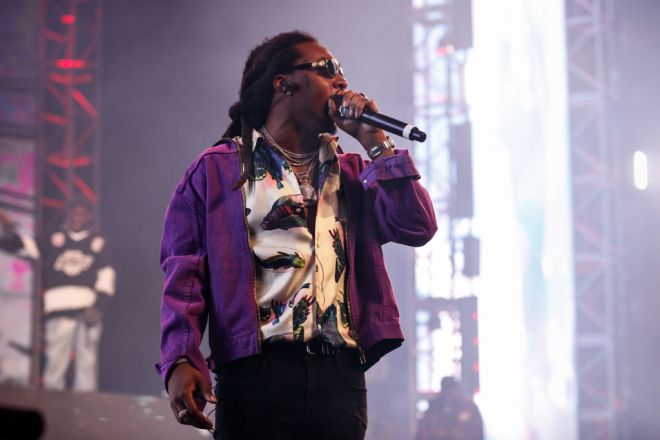
Source: Jay L. Clendenin / Getty
The hip-hop music genre was informed in the 1970s and cultivated a culture shortly after. Hip-hop in its infancy was an outlet embodied by block parties, turntables, a DJ, a mixer, and most importantly, an artist chanting or rapping rhythmically over a beat or instrumental.
Though hip-hop’s humble beginnings were informed by thriving over a beat or rhyme, it has become evident that the state of hip-hop today took an unexpected turn. One so tragic that we’ve relived more than we recovered.
Initially, an outlet to also address the risk of violence faced in an impoverished world, hip-hop grew from turntables and DJs to tragedy and death. In the same manner that hip-hop became a channel of expression for artists, hip-hop became a mirror reflecting the larger problem of gun violence in America. Though the two haven’t always been intertwined, it didn’t take long before hip-hop and violence would shape each other in ways inescapable.
Essentially, hip-hop music has always been an agent of change, becoming a central part of the culture that influenced our vernacular, movement, and way of life. More specifically, hip-hop began to hold dynamic notions of hype and tone that indicated the genre was more than rhyming words.
The key word here is aggression.
The aggression in a rapper’s voice became a key element of expression and often left listeners feeling on edge, hyped or angry. When hip-hop subgenres such as gangster rap emerged in the late 1980s, it asserted a level of rage against issues such as racial oppression, poverty and brutality.
Ice Cube once described it as a form of journalism; reporting on the issues that plagued their neighborhoods and communities. The only difference, Cube says, is that “we were brutally honest.”
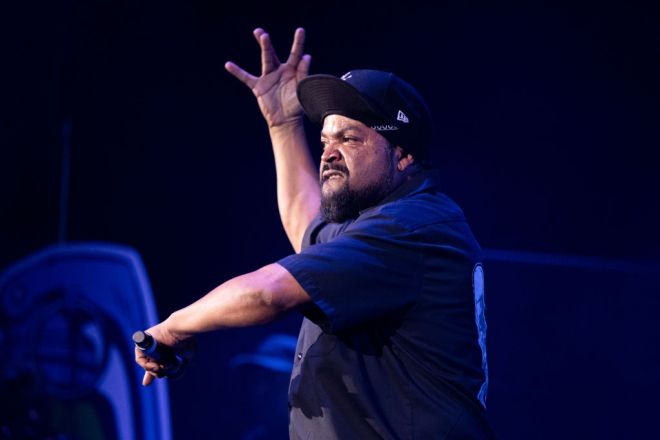
Source: Scott Dudelson / Getty
And the power of aggression conveyed a readiness to attack and confront anything that endangered their rights. It gave rappers a sense of control; an assurance they were in full authority over their lifestyle, decisions, and circumstances. However, such honest nature made the musical genre more controversial and dangerous.
Because apparently when rappers chose aggression, they also chose violence.
Not only did the death of Takeoff reignite conversations around the impact of violence in the hip-hop culture, but it also raised criticisms that rappers engage in their own tragic fate when glamourizing its use in their music.
“We’re not against rap. We’re not against rappers. But we are against those who disgrace our community and culture, and who have absolutely nothing of redemptive value to offer except the legacy of violence and foul language.” — Calvin Butts, senior pastor of the Abyssinian Baptist Church in 1993
“By reinforcing the stereotypes that long hindered blacks, and by teaching young blacks that a thuggish adversarial stance is the properly “authentic” response to a presumptively racist society, rap retards black success.” — John McWhorter, How Hip-Hop Holds Blacks Back, 2003
“We are bombarded by these (‘gangsta’) images again and again and again and again . . .They do make a difference on human behavior.” — Spike Lee at the O’Connell Center in 2006
Such disapproval for hip-hop’s association with violence, unfortunately, led to a general consensus that when all else fails to explain the gun violence that occurs in hip-hop, the initial reaction is to blame a rapper and their music. And moreover, rappers are too involved in the relationship between violence and hip-hop to ever be considered a victim.
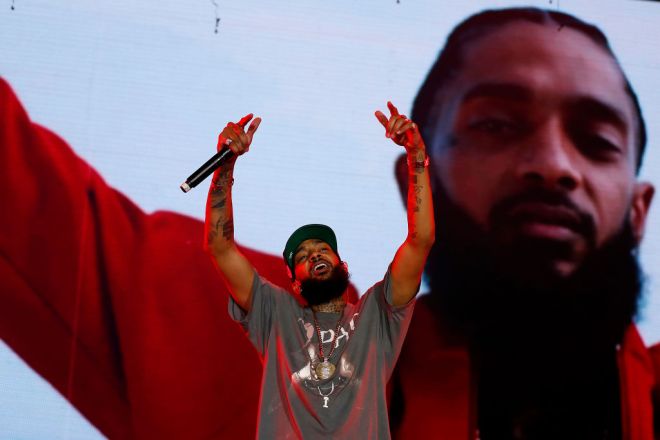
Source: Luis Sinco / Getty
As a result of such criticisms, rapper Nipsey Hussle should’ve taken stronger security measures when visiting his clothing store in Los Angeles. Pop Smoke should’ve known better than to divulge personal information on social media. Young Dolph had no business going back home to Memphis, a city with a record high of more than 300 killings in 2021. And PnB Rock shouldn’t have been wearing jewelry, nor should his girlfriend have posted to social media in real-time while having dinner in Los Angeles.
Victim blaming comes in many forms. Oftentimes, victims are expected to know how to prevent a crime, act of violence or death. Because of this pressure, if a victim does not meet this expectation, they default as a participant in the incident to some degree.
Society teaches us to not be a victim instead of teaching us not to victimize.
Not only does society blame rappers for their own tragic deaths, but it has been made painstakingly clear that rappers can’t possibly be victims of gun violence, too. And because rappers are blamed for violence against themselves, it not only lessens empathy for the rapper as a victim but demonstrates a greater empathy for the actual perpetrator.
And although the cause of death for such rappers has always been apparent, we have been spelling gun violence wrong for many years.
A recent CNN report found that violence has killed at least one rapper since 2018. The recent hip-hop deaths of rappers Trouble, PnB Rock, Lotta Cash Desto, and Takeoff are fatal additions to a continuing trend in the musical culture. Hip-hop and violence bear a relationship casualty so common, that the two have become indistinguishable.
Throughout hip-hop’s 50-something-year-old history, a significant amount of rappers and hip-hop-affiliated figures have been tragically killed. As the primary demographic in hip-hop, the toil of Black people in America is heavy enough. It is even more unfortunate to know that a Black rapper, as influential as they may be, cannot let their guard down or escape victim blaming for violence against them under any circumstances.
And perhaps what worsens this tragedy is that rappers who are blamed for their own deaths are killed twice.
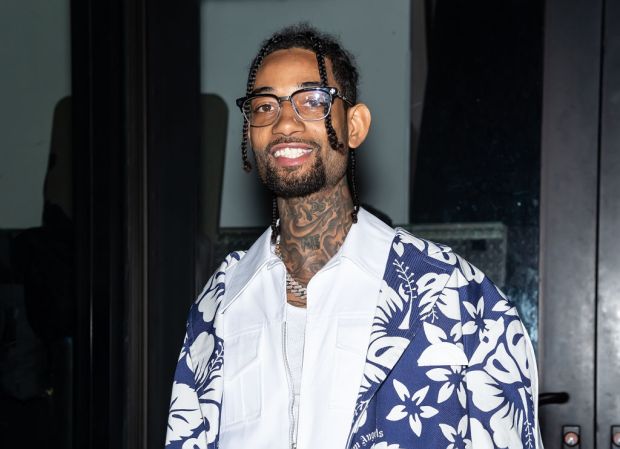
Source: Gilbert Carrasquillo / Getty
America, much like hip-hop shares a complicated pastime with violence. Death by guns has become a fixture in America’s way of life and everyone is in some way dealing with the reality that no matter the profession, circumstances, or environment, you can’t escape gun violence. However, the only difference I’ve found with hip-hop is that it’s perhaps the only community expected to accept responsibility for its own tragic deaths.
The key word here is normalization.
Gun violence is everywhere — in parks, schools, churches, supermarkets, etc. It can happen to everyone, but it never deserves to happen to anyone. And just like gun violence, hip-hop is everywhere, too.
One of the primal underlying contributors to gun violence in hip-hop is the lack of recognizing gun violence as a public health crisis. Hip-hop is a human being, made of flesh and bone, and is the victim of the gun violence epidemic just like anyone else in America.
Addressing underlying factors can also lead to establishing a culture of gun safety, such as enacting sensible gun laws that reduce easy access to dangerous weapons, supporting gun violence research, and expanding access to high-quality health services to help address traumas that may lead to hip-hop deaths.
Hip-hop was created from necessity, not doubt — a means to express what we were feeling. It is very possible that because hip-hop was aggressive enough to be sometimes angry, offensive, misogynistic, and dare I say, dangerous, many were manipulated into believing that rappers could also be the aggressor in their tragic fates, too. But while a case can be made that hip-hop is the blame for a lot of things, it is time we reckon that gun violence is not one of them.
Time and again, we relive the news of another tragic death in the hip-hop community. Hip-Hop is dying and gun violence is the killer. Part of the solution involves the conviction that we can all in some way, do everything in our power to prevent such tragedies from happening.
Takeoff’s death, like many others, while untimely, is, unfortunately, the predictable outcome of America’s lack of will to invest in prevention approaches. The tragic death of rappers is not only an echoed tragedy, but can serve as evidence in addressing the multiple factors that increase the risk of gun violence in America.
But for many of us, perhaps the least we could do is to stop participating in the idea that rappers are incapable of being incorporated into the victimhood of gun violence.
Because as you can see, we can call hip-hop a lot of things, but immortal isn’t one of them.
RELATED CONTENT: We Asked The Kennedy Center Why They Had No Women In Their Fall Hip Hop Line Up, They Had A Good Answer: Their Spring Line Up.


0 Commentaires